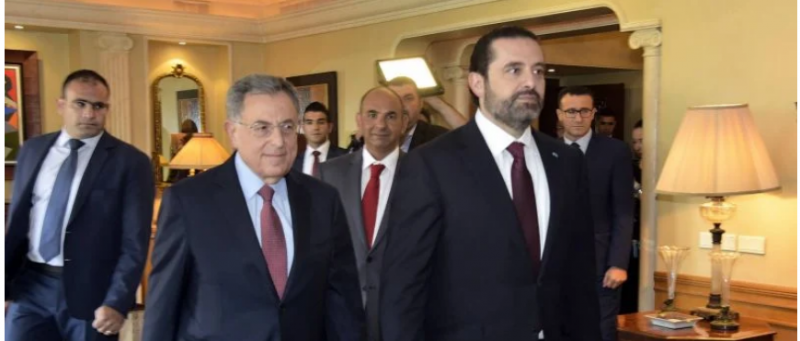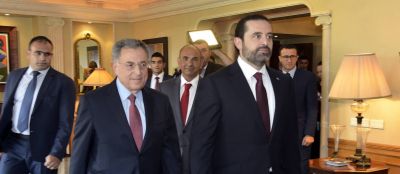
Former Prime Ministers Fouad Siniora (l.) and Saad Hariri. (Credit: Photo archives Dalati and Nohra)
While Hezbollah and its allies have more or less unified their ranks to fight the upcoming electoral battle, their opponents are in a less comfortable position to engage in the competition, mainly due to the disintegration of the Sunni scene. Saad Hariri’s decision to withdraw from politics and boycott the parliamentary elections is far from being met with unanimous approval within his circles.
The Future Movement head and former Prime Minister Fouad Siniora are even at loggerheads in broad daylight over this decision. Siniora announced Tuesday that he is not personally standing as a candidate in May's elections.
However, he remains determined not to leave the stage to newcomers, and insists on his belief that the vacuum left behind would be to the advantage of Hezbollah and its allies.
Siniora has succeeded in rallying several Sunni figures, including Mustapha Allouche, former vice-president of the Future Movement, and former MP Ahmad Fatfat, who took gradual steps away from the party, supporting his cause. Allouche has already taken a step toward taking part in the elections.
It is even said that he managed to convince the Mufti of the Republic, Sunni Sheikh Abdellatif Deriane, and some Gulf countries, including Kuwait, that his decision, which was made under the slogan of defending the state’s sovereignty, is appropriate.
L’Orient-Le Jour learned that he recently embarked on a 24-hour visit to Paris to meet with a senior Saudi official and garner additional support for his initiative.
These efforts are not to the liking of Hariri, who is pressuring members of his party behind the scenes to keep them from partaking, in a way or another, in the elections.
In a press release on Saturday, the Future Movement called to order the party members who still wish to stand as candidates despite the movement’s decision, reiterating the demand not to use the Future Movement label and not to support or publicize another candidate.
Previously, MP Assem Araji (Future Movement/Zahle) announced that he will not stand for reelection in the May 15 polls, in solidarity with the decision taken by Hariri. His announcement followed a similar one by other Future MPs, including MP Rola Tabsh (Future/Beirut II) and MP Mohammad Hajjar (Future/Chouf).
In circles close to Hariri, it is even suggested that the Sunni leader could go even further and call on his popular base to abstain from voting, which would fully undermine Siniora’s efforts.
List in Beirut II district
For his part, Siniora seeks to strengthen the alliance with Joumblatt’s camp and with the Lebanese Forces — which both openly oppose Iranian influence in Lebanon by way of Hezbollah — bringing back to life an equation close to March 14. This political choice will raise Hariri’s ire further.
“The most important thing is that we see eye to eye with Siniora, that the state is taken hostage by Hezbollah, that it must be saved from its hold and that the elections are the means to do so,” an LF official said. He implied that the idea is to revive a dynamic for change and alliances that would resemble the ones that prevailed within the March 14 camp.
In this respect, Siniora and Samir Geagea met in the presence of Fatfat on Saturday, probably to formalize this new partnership.
While this rapprochement between Siniora and the LF has not yet led to the formation of joint lists, a little more progress was made with the Progressive Socialist Party (PSP).
This is the case in the Beirut II district, where the electoral list sponsored by Siniora,who has not yet decided if he wants to stand for elections, is beginning to take shape.
According to corroborating sources, at this point, Siniora prefers to support a list instead of heading it.
Siniora does not want to further provoke the Haririst voters whom he is hoping to convince not to abstain from casting their ballots.
“He is also hesitating because he fears if he fails this would cost him dearly in the political arena,” an analyst close to the PSP said.
According to L’Orient-Le Jour’s political columnist, Mounir Rabih, the Beirut list includes for now Khaled Kabbani (Sunni), a former minister close to Haririst circles, Lina Tannir (Sunni), probably Imad al-Hout (former MP for Al-Jama'ah Al-Islamiyah, or “the Islamic Group”), and possibly Ammar Houry, a member in the Future Movement.
For the Shiite seats, the names of Sanaa al-Jack and Ahmad Ayache have been put forward. Michel Fallah and George Haddad were fielded for the Christian seat, while outgoing PSP MP, Faisal Sayegh, will run once again for the Druze seat.
In Tripoli, the PSP proposed the name of Aafraa Eid (Sunni), the party’s head of office in North Lebanon, to join Siniora’s list. Otherwise, Eid would run on Mikati’s ticket.
The two men have decided to each sponsor a different list, in order to appeal to different electorates.
According to L’Orient-Le Jour’s correspondent in North Lebanon, an embryonic list is taking shape in Tripoli under Siniora’s auspices, which will include the Future Movement’s former vice president, Mustafa Alloush, Osman Alameddine and Haytham Moubayyed, who was close to Ahmad Hariri, the party’s secretary-general.
Fatfat might also figure on the list, according to a Tripolitan source.
Mohammad Kabbara, a Haririst MP, chose not to join Siniora’s list, presumably to avoid falling out with Saad Hariri and preserve his place within the party for the future, according to the aforementioned source.
In Iqlim al-Kharrub (Chouf district), Saadeddin Khatib, who is close to the Future Movement, will run on Joumblatt’s list, reflecting the PSP-Siniora alliance in the area. Everything could change, however, depending on new contacts and the waltz of alliances.
But one thing is for sure: Siniora seems adamant to do his best to be present everywhere across the country in a bid to counter the advance of Hezbollah and its allies.
Saad Hariri’s political suicide?
To this day, no one can really pinpoint the reasons why the Future Movement’s head chose to bow out of politics.
Some say that the Gulf countries banned Hariri from politics, others claim that it was his bitterness that pushed him to go so far in his decision.
“Saad Hariri is disappointed with his opponents as well as his allies,” a former Haririst minister said.
The former premier’s attitude speaks volumes about the tensions within the Hariri camp and the bitterness of its leader vis-à-vis his closest collaborators.
“The day before his withdrawal from the political scene, he had clearly explained to me that he will not participate in the elections because he does not want to serve as a springboard for people in the party who would then stab him in the back,” a close associate of Hariri told L’Orient-Le Jour.
“It’s pure nihilism,” he added.
By torpedoing his own camp, he said, Hariri has also weakened his former Christian and Druze allies and all those who seek to move the country further away from Iranian influence.
"The fear is not only among the Sunnis, but also among the Christians, who are afraid that the aphorism ‘might make right’ would only prove truer now," the former Hariri minister concluded.
This article was originally published in French in L'Orient-Le Jour. Translation by Joelle El Khoury and Sahar Ghoussoub.
